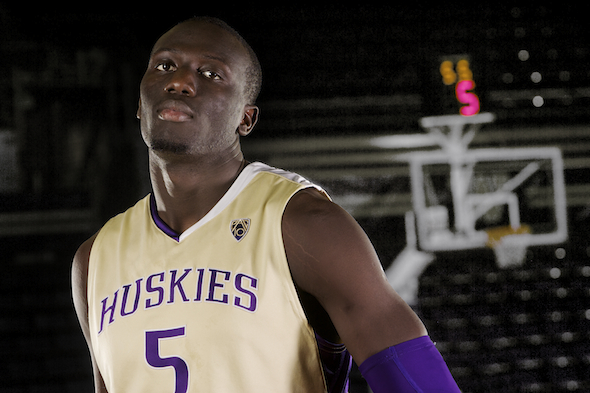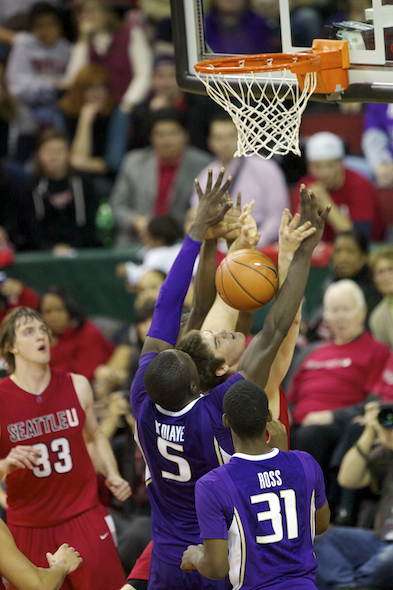
The humility is more striking than the height.
Speak to seven-foot Senegal natives Aziz NDiaye from Washington or Virginias Assane Sene separately and the same answers come.
Without apologies to Charles Barkley, each claims to be a role model.
Both explain its difficult to leave your country to come to the United States.
Both speak of being a man at an age when that is typically unaccomplished.
Undaunted a few years after leaving Senegal to come the U.S., NDiaye, from Dakar, and Sene, from Saint-Louis, are the exploiters of basketball. Counter to the despot-filled disaster that passes for grassroots basketball in America, these two come from a miniature developmental program that is attempting to create the power-wielders.
The two are part of the growing SEEDS, Sport for the Education and Economic Development of Senegal, program based in the moderate-sized city of Thies in western Senegal. Its a developmental academy that combines basketball and education. Basketball is listed first only because the alphabet forces it so, not the SEEDS’ pursuit.
You have to use basketball, dont let basketball use you, NDiaye said. Use basketball to get your education.
NATURE AND TROLLING basketball minds changed things for NDiaye and Sene. Once they hit 6-foot-6, hope of a life playing the countrys dominant sport of soccer was grounded.
As their bodies grew, so did encouragement to try basketball. Sene was eventually swayed to participate in what passed for a basketball game on one of the three courts in Saint-Louis.
No one knew what traveling was, let alone a 2-3 matchup zone.
I didnt know how to shoot the ball; didnt know how to catch the ball, Sene said. Didnt know any moves from basketball.
Because you have the height, a lot of people think it is going to be easy for you, which its not.
His brother sent him shoes and a ball. Sene continued in the refinement-free pickup games. Eventually, he moved to a couple local centers that taught him layups and the base rules.
After a year, Sene began to travel around Senegal to small tournaments. Then off to South Africa. By the time he returned, he had earned an invitation from SEEDS.
NDiaye followed a similar path though he was a more prominent name than Sene. His height came with burgeoning width, which made his reputation grow faster among basketball people.
He spent two years at the academy running through days of conditioning, class, practice, class, practice. School took place at adjacent St. Gabriel. Practice takes place in facilities rented from the government that are little better than most YMCAs in America.

Both learned enough to eventually earn Div. I scholarships in the U.S. After just a handful of years, they adapted from not knowing rules to playing in two of the power college basketball conferences.
I never thought I would get the chance to come to the U.S., Sene said.
THE PROGRAM INTENDS to be cyclical. When NDiaye or Sene show up on a Senegalese television, youngsters begin to ask and think.
When NDiaye and Sene show up at U.S. high schools, Lake Forest (Ill.) and Oak Hill (Va.) respectively, coaches begin to ask and think. Who is that seven-foot kid and where do I get one?
Washington assistant coach Raphael Chillious has ties to each. He coached Sene at South Kent (Conn.) prep school. Chillious saw NDiaye for the first time in 2006 at a SEEDS camp.
The base developing from these two and others around the country begins the churning of program development.
That leaves NDiaye and Sene in weighted roles as young men. Theyre expected to be physical guides. Their time in the U.S. is not just opportunity, but duty.
Thats our big role right now, Sene said. We are role models for the young Senegalese kids. If they heard we all passed through SEEDS before we came to the U.S., theyre all going to want to do the same. They all want go where were at right now.
The reality for Sene is likely not an NBA future. Hes a junior bench player for the Cavaliers who averages 4.3 points and 5.5 rebounds in 21 minutes per game. He has an outside chance at a pro career overseas.
To think of what NDiaye, who had a career-high 15 points Tuesday against Seattle U and is much larger than the thin Sene, could be in three years when he leaves Washington is intriguing. Some form of pro career appears in front of him.
Regardless, each will emerge with the world around him tethered down. Emphasis on education from family bolstered by the travel and environment from SEEDS positioned the two well.
Leaving my country, Im not doing it for my parents, for my family or anybody, Sene said. First Im going to do it for myself because I want to do something with my life.
I dont just want to be in the street. I want to play basketball. I want to have a good education. After that, maybe something good happens that I can really help my family.
ADAPTATION FOR THOSE involved in the program has been necessary beyond the players. Director of U.S. Operations Brian Benjamin joined SEEDS full-time in 2008. His background was in U.S. grassroots basketball.
Benjamin ran into Amadou Gallo Fall — a Senegalese native and worldwide influencer of basketball as the NBAs Vice President of International Development — in Chicago in 2005. Their initial conversation led to a job, one Benjamin is still growing into because the principles are opposite those espoused in much of U.S. developmental basketball.
The sports aspect is not the focus, Benjamin said. Whereas grassroots basketball, not trying to take away from that, AAU and what have you, its all basketball.
Its whatever glamor and glitz basketball can get you or whoever is with you or whoever is on your team.
Benjamin surprises coaches who make the trek to see the programs players overseas at a camp or at Nike-sponsored events like the Nike Global Challenge played in Hillsboro, Ore.
Automatically they think its a basketball factory, Benjamin said. Its really not. Are you going to be giving our students an opportunity to take engineering classes? That was a question I asked a coach and he was like, Really? Engineering? They’re not used to that.”
Money is hard to come by for the program. Benjamin says most is raised through private donations stoked by word-of-mouth. The academy has a sponsorship deal with Nike that Benjamin says helps quite a bit.
The ambition is to have an academy for boys and girls that is under the same roof. Currently, SEEDS works with 22 boys ages 15-18. Benjamin knows the challenges are financial and cultural, two things that also sit as benefits of the academy.
I dont think (basketball) will ever overtake the sport of soccer, Benjamin said. I think what will happen is kids will start playing them simultaneously. Similar to football and basketball in the U.S.
THE SENEGALESE IMPORTS come with uncommon disposition. Washington coach Lorenzo Romar described NDiaye earlier this season as his own man.
Theyre calm, hard-working, future-focused players free of much of the pettiness that permeates basketball in America.
That demeanor is based in Senegals cultural values, then reinforced to the members of SEEDS.
Its been an eye-opener for me, Benjamin said. Just developing the relationships with the boys and understanding the sense of responsibility when they go there. I can say all I want about the academy, but its really something culturally where its embedded from home.
The program is in its eighth year. If successful, it will begin to dial back the age Senegalese players begin to play. Their skills will be developed earlier allowing them to come to the U.S. for more than size.
Theres a lot of talent back there, NDiaye said. You see young players that are just tall. They need to understand what it takes and they need some help.
That starts with those who have already received it.

2 Comments
proud of you bro!!!!
proud of you bro!!!!